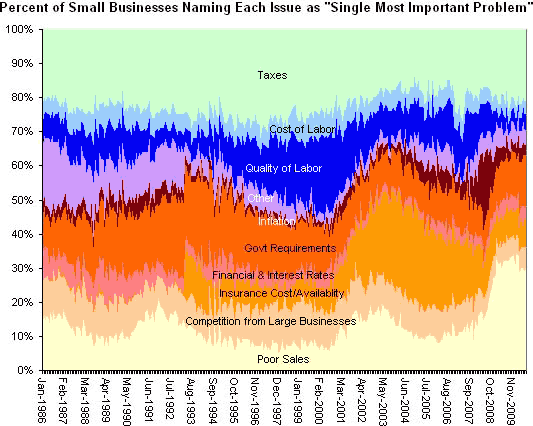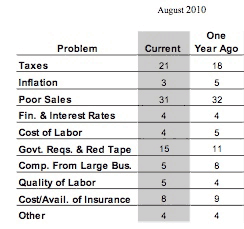I certainly agree that the most important factor holding back employment growth at the moment is low demand for firms’ products and services. But I disagree with those who suggest that this is the only factor.
Paul Krugman declared last week:
Businesses aren’t hiring because of poor sales, period, end of story.
The statement that businesses aren’t hiring is simply false. According to the Bureau of Labor Statistics’ Job Openings and Labor Turnover Survey, the U.S. private sector hired 3.9 million new workers every month, on average, over the first 7 months of 2010.
But if that’s true, then why isn’t total employment booming? The answer is that, according to the same JOLTS data, some 3.8 million workers quit or lost their jobs each month on average during Jan-July. The difference between gross new hires and gross separations was only enough to add about 100,000 net new private-sector jobs each month. There are some discrepancies between the extent of net job creation implied by the JOLTS data and the number inferred from other sources such as the BLS establishment survey. But the fact that small changes in net employment figures mask a dynamic economy in which there are huge gross changes in employment status for individuals and firms is quite indisputable.
For the establishments that are hiring millions of new workers every month, what factors went into their decision, and what would have to change to persuade them to hire more? I believe the correct answer is that the firms compared the benefits of hiring new workers against the costs, and decided it made sense to bring some 3.9 million new people on board each month, but no more.
And why no more than that? Paul’s answer is based on Catherine Rampell’s observation that there has been a significant increase since 2007 in the fraction of small businesses reporting poor sales as their biggest single problem.

Source: Economix
But Russ Roberts isn’t convinced.
It’s also worth pointing out that “biggest problem” doesn’t mean that the second or third problems aren’t important or aren’t really close to as important as the biggest. In fact, if you look at just the latest data from the NFIB rather than the distracting previous three decades, you see this:

Source: Cafe Hayek
Yes, 31% of respondents do say that sales are their “biggest problem.” That number hasn’t budged much over the last year. But two numbers have changed a bit more than that– 21% of respondents list taxes as their biggest problem up from 18% a year ago. And 15% list government regulations and red tape as their biggest problem, up from 11%. In fact, if there had been one category called “Taxes and Government Regulations” it might have been seen as the biggest problem, listed by 36% of respondents, up from 29% in the year before and surpassing sales as the biggest problem.
I agree with Paul that a low level of demand is the most important factor holding back employment growth. But I think it may be a mistake to conclude from that fact that aggregate demand management is the only tool available to address the problem.



high unemployment was cancer, the u s is stage four and spreading. krugman’s right, the unemployment cancer is spreading fast, it’s hail mary time,50 million unemployed by this time next year, thats a s***load of food stamps